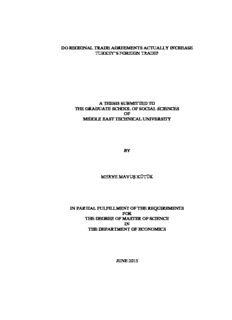Table Of ContentDO REGIONAL TRADE AGREEMENTS ACTUALLY INCREASE
TURKEY’S FOREIGN TRADE?
A THESIS SUBMITTED TO
THE GRADUATE SCHOOL OF SOCIAL SCIENCES
OF
MIDDLE EAST TECHNICAL UNIVERSITY
BY
MERVE MAVUŞ KÜTÜK
IN PARTIAL FULFILLMENT OF THE REQUIREMENTS
FOR
THE DEGREE OF MASTER OF SCIENCE
IN
THE DEPARTMENT OF ECONOMICS
JUNE 2015
Approval of the Graduate School of Social Sciences
Prof. Dr. Meliha Altunışık
Director
I certify that this thesis satisfies all the requirements as a thesis for the
degree of Master of Science.
Prof. Dr. Nadir Öcal
Head of Department
This is to certify that we have read this thesis and that in our opinion it is
fully adequate, in scope and quality, as a thesis for the degree of Master of
Science.
Assoc. Prof. Dr. Elif Akbostancı Özkazanç
Supervisor
Examining Committee Members
Prof.Dr.Nadir Öcal (METU, ECON)
Assoc. Prof. Dr. Elif Akbostancı Özkazanç (METU, ECON)
Assoc. Prof. Dr. Ozan Eruygur (Gazi Üniversitesi, ECON)
I hereby declare that all information in this document has been
obtained and presented in accordance with academic rules and ethical
conduct. I also declare that, as required by these rules and conduct, I
have fully cited and referenced all material and results that are not
original to this work.
Name, Last name : MERVE MAVUŞ KÜTÜK
Signature :
iii
ABSTRACT
DO REGIONAL TRADE AGREEMENTS ACTUALLY INCREASE
TURKEY’S FOREIGN TRADE?
MAVUŞ KÜTÜK, Merve
M.Sc., Department of Economics
Supervisor: Assoc. Prof. Dr. Elif Akbostancı Özkazanç
June 2015, 110 Pages
Regional trade agreements (RTAs) have important role in Turkey’s foreign
trade. Turkey, which has a customs union with the European Union (EU),
has to apply the Common Commercial Policy of the EU in line with
obligations arisen from the Customs Union Decision. Within this
framework, attempts to sign free trade agreements (FTAs) with countries
which have a FTA with the EU have been maintained. In the current
situation, Turkey has FTAs with 20 countries and Turkey’s foreign trade
with the EU members is conducted under provisions of the Customs Union
Decision. The aim of this study is to analyze whether the RTAs of Turkey
are an increasing factor in her foreign trade or not. In the study, Turkey’s
foreign trade with 126 countries or country groups is analyzed using the
gravity model. Impacts of the RTAs on Turkey’s foreign trade are measured
through panel data estimations of the classical gravity model extended by
variables defined for RTAs and fixed effects. In this regard, empirical
evidences reveal that the Customs Union does not affect Turkey’s export but
iv
it is an increasing factor in import of Turkey. Also, it is obtained that the
FTAs do not have any impact on either export or import of Turkey.
Keywords: Gravity model, customs union, free trade agreements, foreign
trade, Turkey.
v
ÖZ
BÖLGESEL TİCARET ANLAŞMALARI TÜRKİYE’NİN DIŞ
TİCARETİNİ ARTIRIYOR MU?
MAVUŞ KÜTÜK, Merve
M.Sc., Department of Economics
Supervisor: Assoc. Prof. Dr. Elif Akbostancı Özkazanç
Haziran 2015, 110 Sayfa
Türkiye’nin dış ticaret politikasında bölgesel anlaşmalar önemli bir yere
sahiptir. Avrupa Birliği ile Gümrük Birliğine sahip olan Türkiye, bu
anlaşmadan doğan sorumlulukları doğrultusunda Avrupa Birliği ile ortak dış
ticaret politikası uygulamakla yükümlüdür. Bu politika kapsamında Avrupa
Birliği’nin serbest ticaret anlaşmasına (STA) sahip olduğu ülkelerle STA
imzalama girişimleri sürdürülmektedir. Türkiye, mevcut durumda 20 ülke
ile STA’ya sahip olup Avrupa Birliği ülkeleri ile olan dış ticaretini de
Gümrük Birliği Kararı kapsamında yürütmektedir. Bu çalışmanın amacı,
Türkiye’nin taraf olduğu bölgesel ticaret anlaşmalarının Türkiye’nin dış
ticaretini artırıcı bir unsur olup olmadığını araştırmaktır. Çalışmada, 1992-
2013 yılları arasında Türkiye’nin 126 ülke veya ülke grupları ile
gerçekleştirdiği dış ticaret çekim modeli üzerinden incelenmektedir. Çekim
vi
modeli denklemi geleneksel değişkenlerin yanında bölgesel ticaret
anlaşmaları ve sabit etkiler değişkenleri ile genişletilip panel veri analizi
yöntemleri ile tahmin edilerek bölgesel ticaret anlaşmalarının Türkiye’nin
dış ticareti üzerindeki etkisi tespit edilmektedir. Bu kapsamda, elde edilen
bulgular Gümrük Birliği’nin Türkiye’nin ihracatını etkilemediğini ancak
ithalatında artırıcı bir unsur olduğunu ortaya koymaktadır. STA’ların ise
Türkiye’nin hem ihracatı hem de ithalatı üzerinde etkisi bulunmadığı
sonucuna ulaşılmaktadır.
Anahtar Kelimeler: Çekim modeli, gümrük birliği, serbest ticaret
anlaşmaları, dış ticaret, Türkiye.
vii
To Samet
viii
ACKNOWLEDGEMENT
I would like to express my deepest gratitude to my supervisor Assoc. Prof.
Dr. Elif Akbostancı Özkazanç for her patience, encouragements, guidance,
advice, criticism, and insight throughout the research. It was a great honor
for me to work with her in this study.
I would like to thank my mother Ayla Mavuş for her continuous support,
and eternal love throughout my life. She is the unique superhero in this life
in the raw.
Finally, I would like to express my greatest thanks to my husband Samet
Kütük. He is beginning, love, patience, happiness, courage, success, past,
future, in short, story – of my life.
This study was supported by The Scientific and Technological Research
Council of Turkey (TÜBİTAK) Grant No: 2210- Yurt İçi Yüksek Lisans
Burs Programı.
ix
TABLE OF CONTENTS
PLAGIARISM .............................................................................................. iii
ABSTRACT ................................................................................................. iv
ÖZ ................................................................................................................. vi
DEDICATION ........................................................................................... viii
ACKNOWLEDGEMENTS ......................................................................... ix
TABLE OF CONTENTS ............................................................................... x
LIST OF TABLES ...................................................................................... xii
LIST OF FIGURES .................................................................................... xiv
CHAPTER
1. INTRODUCTION ...................................................................................... 1
2. TURKISH FOREIGN TRADE .................................................................. 4
2.1 A Brief Look at Turkey’s Foreign Trade Policy ................................ 4
2.2 State of Foreign Trade in Turkey ...................................................... 15
3. LITERATURE REVIEW ......................................................................... 31
3.1 Literature on the Gravity Model ....................................................... 31
3.2 The gravity model and Turkey ......................................................... 39
3.3 Studies related to Turkey’s regional trade agreements without
gravity model ............................................................................................ 41
4. MODEL, DATA AND EMPIRICAL RESULTS .................................... 44
5. CONCLUSION ........................................................................................ 66
REFERENCES ............................................................................................. 68
x
Description:Dr. Elif Akbostancı Özkazanç. June 2015, 110 Pages. Regional trade agreements (RTAs) have important role in Turkey's foreign trade. Turkey, which

